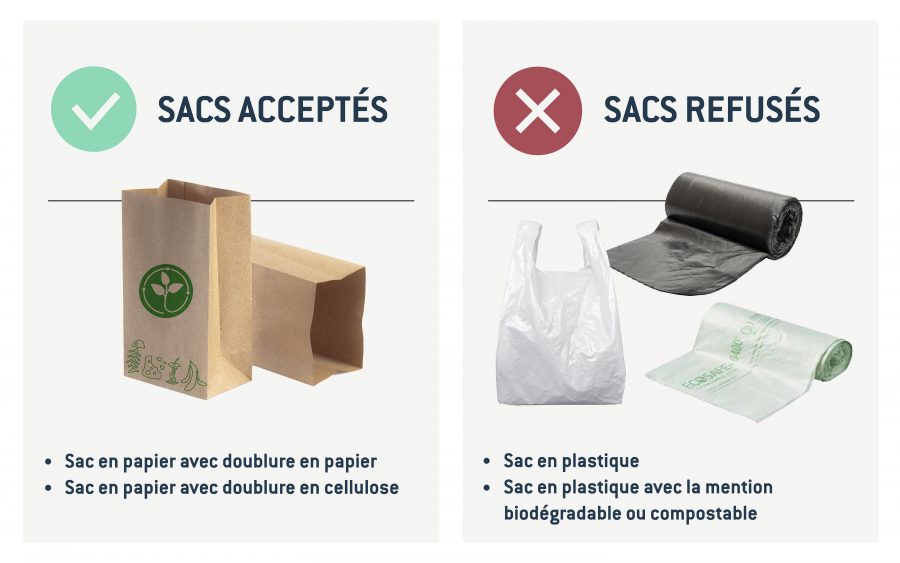Organic waste
Expected delays for the collection of organic wasteFor up-to-date information regarding collections, click here |
The collection of organic waste enables composting of residues and its subsequent transformation into compost. This diverts organic waste from landfill sites, where it generates methane and contributes to greenhouse gas emissions. By participating in organic waste collection, your food residues become natural fertilizer for our soils and reduce our ecological footprint.
To determine whether you can put your items in the organics bin, ask yourself these three questions:
- Is it edible?
- Is it paper or cardboard with traces of food on it?
- Is it garden waste without soil?
If you answered yes to any of these three questions, your item must be disposed of in the organic waste bin.
To facilitate the recovery of your food residues, opt for a food transfer container that can be installed on the kitchen counter and emptied into the outdoor collection bin on a regular basis. The city provides residents with a kitchen cone upon request. However, a container with a lid works just fine.
For collection schedules, consult the Collection Calendar.
Collection bins
For this collection, only the green wheeled bin provided by the City may be used. It cannot be used for any other collection.
The City offers three sizes of bins to accommodate your needs. Please note that a maximum weight recommended by the supplier so that employees are able to move the bin to empty its contents into the truck.
| Bin sizes | Maximum weight |
| 80 L | 75 lbs |
| 120 L | 110 lbs |
| 240 L | 150 lbs |
Getting a second or different size bin
You can request a different size bin or a second one at any time. To submit a request, go to Online requests.
Damaged bins
If your bin is damaged, you can submit a request to have it repaired or replaced. Go to the Online Requests page to complete the form.
To make your request, please have :
- A photo of the damaged bin
- The serial number on the side of the bin
- Your contact details
Instructions
- Your green wheeled bin must be placed at the end of your driveway, near the public thoroughfare, after 6 p.m. the day before or before 7 a.m. on collection day.
- Only green wheeled bins for organic materials within the maximum weight limit are accepted.
- The lid of the bin must be completely closed.
- The wheels and handles of the wheeled bin must face your home.
- A space of 30 cm (1 ft) must be left around the wheeled bin.
- Only organic materials placed in the bin are collected.
After the collection, your bins must remove no later than 10 p.m. the day of the collection. Outside of the collection day, the bin must be stored where it is least visible from the street and least likely to inconvenience neighbouring properties.
Accepted materials
| Kitchen waste (raw, cooked or spoiled food) | Yard waste | Other waste |
|
|
|
Yard waste : Please note that noxious invasive plants (buckthorn, common reed, ragweed, poison ivy, Japanese knotweed etc.) must be placed in the household waste bin. Do not dispose of them in the organic waste bin or in natural areas to prevent their spread.
Plastic bags, even if marked biodegradable or compostable, are not accepted.

Leaves and branches
Leaf bags are only collected during leaf collection. At all other times, leaves should be placed in the green wheeled bin or used to make natural fertilizer through leaf recycling.
Only evergreen branches less than 1 m long and 5 cm in diameter will be collected. They must be placed in the bin.
For full details of these collections, visit the Leaf and branch collections page.
Collection in the commercial sector
Your business would like to take part in the collection of organic materials? All you need to do is submit a request to participate and obtain the bins.
Go to the Online requests page to submit your application to obtain the bins and participate in the collection.
You can request up to two (2) collection bins to participate in the collection. If your needs are greater, you can contact the Public Works and Buildings Department to discuss your options.
Information
514-630-1230, tp@pointe-claire.ca
